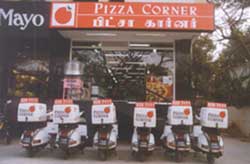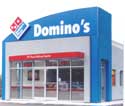Pizza and logistics?
20 Feb 2001
"We are more a logistics company than a food service chain," remarks Mr. Pavan Bhatia, chief executive officer of Domino's Pizza India. What he says is, indeed, true. It is wrong to conclude that running a pizza chain is easy by looking its front-end operations. Compared to the complexities involved in managing a supply chain, the promise of pizza delivery within 30 minutes or offering it free is a child's play for pizza chains. "Supply chain management is the factor that differentiates the winners and the losers in this business," Mr. Bhatia emphasises.
It is wrong to conclude that running a pizza chain is easy by looking its front-end operations. Compared to the complexities involved in managing a supply chain, the promise of pizza delivery within 30 minutes or offering it free is a child's play for pizza chains. "Supply chain management is the factor that differentiates the winners and the losers in this business," Mr. Bhatia emphasises.
For example, the Pepperoni and Jalapeno needs of Domino's Pizza are flown in from Australia and Spain respectively. Within India, the chain sources other vegetables, including onions, potatoes, tomatoes, etc., from different markets at their prevailing prices. Even cartons are centrally purchased to avail of the benefit of scale.
On the other hand, Pizza Corner imports all its potato requirements from Canada. The other major imports for Pizza Corner are cheese and olive oil. Lately, the company has started sourcing cheese from a Bangalore-based company. According to Mr. Antoine Bakhache, chief executive, Pizza Corner, imported potatoes land at ports in Mumbai or the Delhi airport. The consignment is then transported to other parts of the country.
According to Mr. Antoine Bakhache, chief executive, Pizza Corner, imported potatoes land at ports in Mumbai or the Delhi airport. The consignment is then transported to other parts of the country.
For the Pizza Hut chain, cheese is imported from New Zealand, while chicken and bread are sourced locally.
Besides ambience and pricing, one of the important attributes of a food service chain is maintaining a uniform taste across all its the outlets. Hence, chains like Domino's Pizza and Pizza Corner have set up commissaries in different cities. While the former has five commissaries, the latter operates four.
The inputs sourced from various places are supplied to the commissaries in reefers/refrigerated trucks for process and production of base material. The pizza dough and other items prepared in commissaries are then sent to the retail outlets again in reefers.
"Based on the distance between the retail outlets and the commissaries, the temperature inside the trucks is fixed so as to set the dough to a required level when it reaches the outlets," explains Mr. Bhatia. According to him, retail outlets have to exhaust the processed dough within three days of delivery. However, due to some reason if they fail to do so, the entire quantity is discarded. The existing commissaries and the reefers will be put to optimum use as Domino's India is now opening counters in Indian Oil Corporation's petrol bunks. The company will not incur any additional transportation costs so long as the counters are along the highway or the truck's route.
According to him, retail outlets have to exhaust the processed dough within three days of delivery. However, due to some reason if they fail to do so, the entire quantity is discarded. The existing commissaries and the reefers will be put to optimum use as Domino's India is now opening counters in Indian Oil Corporation's petrol bunks. The company will not incur any additional transportation costs so long as the counters are along the highway or the truck's route.
Agreeing that there is spare capacity in the reefers that could be used to carry similar items for other food chains, Mr. Bhatia says, "We do that elsewhere in the world. We have got offers for such a service and we are looking at them seriously."


















